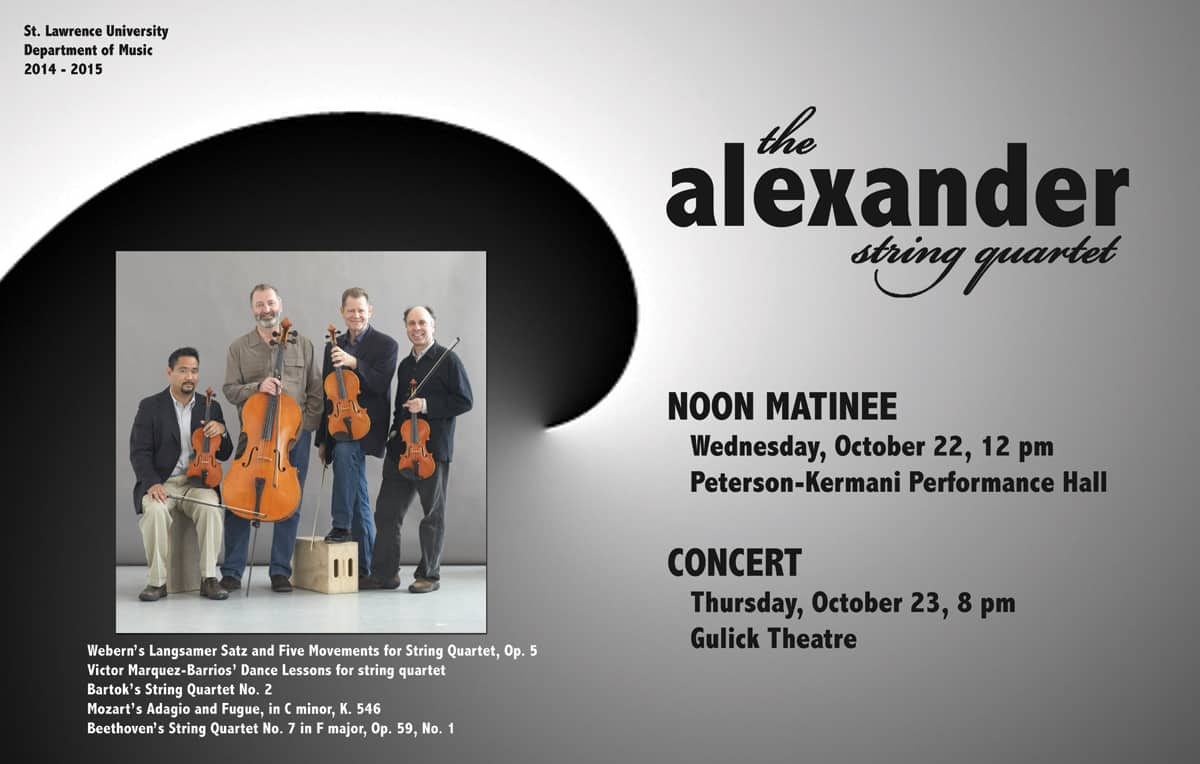Alexander String Quartet to give the world premiere performance (Thursday, October 23, 2014) of Dance Lessongs for String Quartet by Victor E. Marquez-Barrios:
Dance Lessons is a series of short pieces attempting to replicate voluntarily and with sound, the kind of involuntary beat displacement evident in an untalented dancer’s movements. The pieces draw inspiration from personal foibles, as well as literary quotes referencing dance-related situations:
- The Upside-down Triangle: Based on a dance from my home state of Zulia, in Venezuela, this piece is inspired by an anecdote involving a stubborn father (mine), defending an imaginary triangle-shaped map in his head over the actual map held by his daughter (my sister), while totally lost driving during a family vacation.
- The Broken Pianola: “José Arcadio Buendía stopped his pursuit of the image of God, convinced of His nonexistence, and he took the pianola apart in order to decipher its magical secret. Two days before the party, swamped in a shower of leftover keys and hammers, bungling in the midst of a mix up of strings that would unroll in one direction and roll up again in the other, he succeeded in a fashion in putting the instrument back together. . . Those who were familiar with the piano, popular in other towns in the swamp, felt a little disheartened, but more bitter was Úrsula’s disappointment when she put in the first roll so that Amaranta and Rebeca could begin the dancing and the mechanism did not work… Finally, José Arcadio managed, by mistake, to move a device that was stuck and the music came out, first in a burst and then in a flow of mixed-up notes. Beating against the strings that had been put in without order or concert and had been tuned with temerity, the hammers let go. But the stubborn descendants of the twenty-one intrepid people who plowed through the mountains in search of the sea to the west avoided the reefs of the melodic mix-up and the dancing went on until dawn.” From One Hundred Years of Solitude, by Gabriel Garcia Marquez.
- Henry Could Fiddle: “As an amateur fiddler, [Henry] Ford had a special passion for the violin and – as one of the wealthiest men in the world – could indulge this passion by buying the finest violins… By January 1926, Ford had purchased a total of seven exquisite Italian-made violins, crafted by Cremona’s master violinmakers during the 17th and 18th centuries… Ford often played his classical violins for his own enjoyment, usually scratching out tunes like Turkey in the Straw.” Jeanine Head Miller, Curator of Domestic Life, The Henry Ford Museum.
—Victor E. Marquez Barrios

